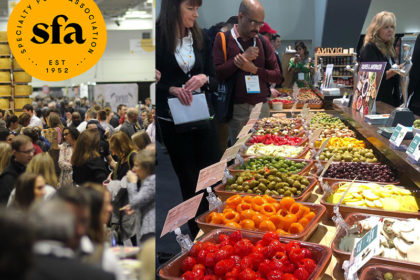
At this week’’s Winter Fancy Food Show in San Francisco, Mintel research announced what a senior analyst called a “major milestone” — specialty food and beverage sales account for 16% of all food and beverage sales, with a record year of growth at $148.7 billion.
The biggest drivers of the specialty food market are 1) functional drinks aiding the microbiome, 2) snacks rich in protein and low in sugar, 3) plant-based foods with unique innovation and 4) international sauces and seasonings from new regions of the globe.
Research from Mintel and the Specialty Food Association shows that nearly three in four consumers purchase specialty food products. The specialty food market is defined as premium products, food made in small batches, food featuring authentic recipes or food made with high-quality ingredients.
“I think so many consumers are more aware of what they’re eating and are more interested in what they’re eating, they’re curious about it, they care about clean ingredients and quality foods. And were on the cusp of all of that,” said Denise Purcell, director of content for the Specialty Food Association.
Some key points from research highlighted at the winter show:
- Specialty beverages hold 18% share of all specialty products, totalling $14 billion in sales. Consumers want functional drinks that boost energy, mental focus, relaxation and microbiome health.
- Snack foods total $18 billion in sales, 27% of the specialty food and beverage share. The fastest growing sellers were turkey and meat (10% growth), then chocolate and other confectionery (9% growth) and juices and functional beverages (7% growth).
- Plant-based foods “It’s a movement, it’s hard to call it a trend anymore,” Purcell noted. Innovations in plant-based items are leading growth in their segment, like shelf stable creams and creamers (37% growth), plant-based meat alternatives (36% growth) and refrigerated creams and creamers (20% growth). One-third of specialty food consumers have purchased plant-based products. And 90% of specialty food consumers, Mintel found, are “committed plant-based consumers.”
- E-commerce is the key specialty food purchasing channel. Today, 41% of shoppers buy at least some of their groceries online, with Mintel estimating online specialty sales will double to $6 billion in sales in the next few years.
- The top 10 online specialty categories for sales from specialty food consumers include:
- Sparkling water (15%)
- Nuts, seeds, trail mix, dried fruit (11%)
- Soda and carbonated beverages (11%)
- Bars (10%)
- Juice (10%)
- Marketing and positioning claims is an important branding element, too. Sales from positioning claims were led by:
- Natural (68%)
- Organic (55%)
- Non-GMO (45%)
- Locally-sourced (41%)
- Eco-friendly (40%)
- Ethical (37%)
- Fair trade (36%)
- Plant-based (34%)
- Gluten-free (27%)
- Sustainable (25%)
- Global sauces and seasonings are also trending, especially flavors interesting new regions of the globe. Trends are showing customers are willing to pay more for these higher-quality, authentic ingredients. “People…always want to see a value,” says Mat Schuster, chef at Canela Bistro & Wine Bar. “It doesn’t mean they want to pay less, per say, but they want to feel the value. So if they’re getting an ingredient that they feel is special, that is authentic, that is flavorful, then that is part of the thing that builds the value to them.”
